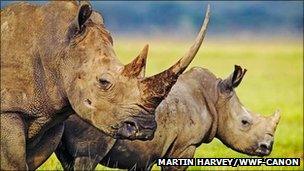Rhino horn: Fooling the thieves lured by riches
- Published

Myths surrounding the healing powers of rhino horns have fuelled an illegal trade in the items
The thieves who broke into the Natural History Museum in Tring during the early hours of Saturday morning probably thought it had been a good night's work.
They took two rhino horns, weighing 2kg each and worth about £240,000 on the black market. Or so they thought.
Unfortunately for them, staff at the Hertfordshire museum were aware of the string of thefts from other museums and auction houses, and had swapped the real rhino horns for carefully crafted fakes, almost indistinguishable from the real thing. And totally worthless.
This year alone, gangs have stolen rhino horns from more than 30 collections across Europe. A Czech castle has been targeted, natural history museums in Belgium, Germany, France and Italy, and other sites in Portugal and Sweden.
In Britain, rhino horns have also been stolen from the Haslemere Educational Museum in Surrey and at the end of July thieves passed over a 2,000 year old Egyptian death mask to take a horn from Ipswich Museum.
Poaching crisis
These gangs are organised and plan in advance. The head of security for the Natural History Museum, Andrew Wilkinson, says they had an idea that they were being targeted: "We believe we were the subject of a hostile reconnaissance the week before. Staff spotted the man and we were able to put in extra measures to ensure that we were fully prepared.
"But it didn't stop them getting in. They made an initial attempt on the front door at midnight. The police were called and we repaired the door. Unfortunately they came back at half-past-four and got in through a first-storey window."
It can be no coincidence that at the same time, conservationists are warning that the world's rhino population is facing a poaching crisis.
Richard Thomas, from wildlife trade monitoring network Traffic, says the number of animals being killed has increased dramatically: "Increasingly we're seeing live animals targeted. The number of rhinos being poached in South Africa has risen from a dozen or so four or five years ago to last year when we reached a record high of 333. But we're way past 200 animals already this year."
Britain has taken a lead in the fight against the illegal trade in rhino horns. A week ago, the government secured an international agreement to curb sales and will lead to talks on how to fight myths about the medicinal powers of rhino horn.
Scarcity value
And this is the real problem. In China, traditionally rhino horn powder was used to treat fever, but a modern myth has sprung up - that has no basis in science - that it can cure cancer.
In Vietnam they are prized by the rich to display in their homes, pushing demand even higher.
Globally, the campaign to stop the trade in rhino horns has been very successful and any loopholes in the law that allowed the legal trade of antique horns have now been closed.
This makes their availability scarce but, with demand from Asia high, the prices have soared. On the black market rhino horns sell for around £50,000 per kilo, making them more valuable than gold and cocaine.
Mr Thomas said: "Organised crime steps in anywhere where there's quick and easy money to be made, and rhino horns have hit their radar. They're easy to conceal and therefore easy to smuggle."
The Natural History Museum may have thwarted the rhino horn thieves this time, but it is unlikely they will be the last collection to be hit. While demand is high, and there is big money to be made, someone will try to find a way around the law.
- Published27 August 2011
- Published20 August 2011
- Published28 July 2011
- Published25 July 2011